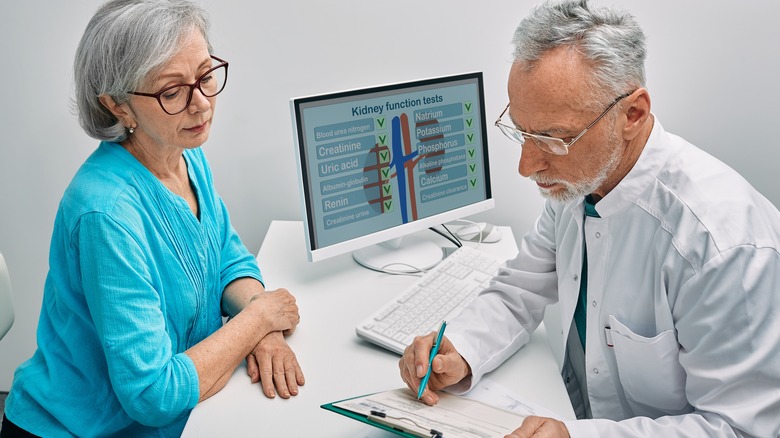The Underrated Fruit That Can Reduce Your Risk Of Painful Kidney Stones
Kidney stones are hardly a walk in the park. Not only can they cause intense and acute pain, but they have a habit of recurring in many people. Yet it may be possible for you to reduce your risk of having a first (or next) kidney stone by eating a very underrated and unassuming fruit.
First, though, you should know that kidney stones aren't "stones" in the gravelly road sense. They're mineral and salt crystalline deposits that develop within the kidneys, as described by the Mayo Clinic. As elements such as calcium build within the kidneys (which happens when calcium isn't adequately flushed out through urination), they begin to cluster together. Those clusters become hard — and when they start to move out of the body, they irritate the surrounding nerves and tissues. (That's where the pain comes in.)
Kidney stones may be unwanted, but they're not unusual. The National Kidney Foundation explains that about 10% of all individuals will have the unpleasant experience of being diagnosed with a kidney stone. Moreover, getting one kidney stone increases the odds of getting another within five to seven years by around 50%.
In other words, it's best to prevent getting kidney stones if you can. One way to do that is to eat foods high in malic acid, like pears. Consuming malic acid can help raise your urine's pH, thereby lessening the chance that kidney stones will form.
Kidney-friendly pears and malic acid
Pears contain plenty of acids, and a 2022 study from the Journal of Food Composition and Analysis indicates that among the most prevalent and dominant of all those acids was malic acid. Malic acid may be exactly what your body needs if you struggle with kidney stones. Just ask Destini Moody, a registered dietitian at Top Nutrition Coaching.
When talking about consuming pears as a strategy to lower a person's risk of kidney stones, Moody agrees that pears are promising. She explains that the malic acid in pears may cause enough of a urine pH change to make it difficult for salts and minerals to transform into kidney stones. Moody adds that there's another benefit to malic acid: "Malic acid also converts into citrate, which binds to calcium for excretion which prevents the formation of stones as well." Consequently, treating yourself to pears could help you avoid kidney stones in two ways.
A 2024 review from the Asian Journal of Urology supports Moody's explanation of why malic acid is such an ally to people trying to reduce their risk of developing kidney stones. In the review, malic acid was "found to reduce known urinary risk factors" because it overhauled pH levels in the kidneys. Information from the National Kidney Foundation addresses Moody's insights into the advantages of citrate by noting that the introduction of citrate is an acceptable treatment for people who get repeated kidney stones.
Keeping kidney stones at a distance
Consuming pears for their malic acid isn't the only way to avoid the discomfort of kidney stones. Another healthy habit that Destini Moody recommends is steering clear of inflammatory foods. These include saturated fat-laden animal proteins, as well as products with excessive amounts of sugars and sodium. And drinking lots of water always gets a thumbs up from Moody: "It's also important to always stay hydrated, as overly concentrated urine due to dehydration can encourage stone formation."
In fact, it's water that the National Institute of Diabetes and Digestive and Kidney Diseases highlights as "the most important thing you can do to prevent kidney stones." The organization suggests drinking between 48 and 64 ounces of water daily. Water isn't just a way to stop kidney stones from forming, either. It can be part of the therapy to pass a kidney stone.
No matter what, it's wise to learn the warning signs of potential kidney stone development to prompt immediate medical intervention. The Cleveland Clinic notes that pain in the abdomen, side of the body, or lower back can be a telltale indicator of kidney stones. Other symptoms of kidney stones may include bloody or bad-smelling urine, needing to go to the bathroom more frequently than usual, and coming down with a fever. However, since these can be symptoms of other conditions and diseases, any potential problems should be discussed with a provider to ensure an accurate diagnosis and speedy treatment.



